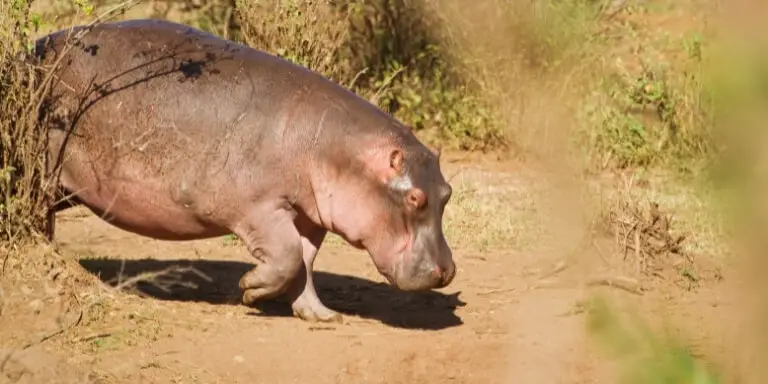The hippopotamuses usually grunt, groan and growl. They also make loud wheezing noises. Most of their communication happens underwater and the noise travels along the river at a distance. Their ability to make long-distance conversation by producing uproarious noises and other unique vocalizations have made people more curious to research what sound does a hippo makes.
Though the meanings of all the sounds of hippopotami are not puzzled out yet, Hippos usually squeak, croak and their common communication happen through honking.

Kinds of sounds hippopotamuses make
The hippos usually honk and this noise can be compared to deep laughter. The hippopotami produce a variety of noises for their communication. In some cases, you may also find similarities between a dolphin sound and the noise of a hippo. And sometimes their loud sounds may seem to be the chuffing noises.

Although hippos are semi-aquatic animals, they love to pass most of the time semi-submerged in the water. Hippos usually spend their life both in water and on land. The unique lifestyle of the hippopotamus has made people curious to know what noise does a hippo make underwater, as it is said that 80% of their communication happens under the water surface.
However, hippos are able to communicate both under the water and above the water surface concurrently. A Hippo uses nostrils to produce noises above water and jawbones to resonate the noises under the water surface. And this is obviously one of the unique features that these African mammals have.
You will be amazed to know that most people don’t know that hippos are able to make loud sounds. ‘Are hippos loud? A common question asked by many animal lovers. The simple answer to this question is yes, hippos can make loud sounds that can reach up to 115 decibels.
Hippos roar and honk to assert their dominance. Hippopotami make loud sounds that reach the neighboring parts and this loud sound can be heard even from a mile away and the sound level can be compared as equivalent to a Rock concert.
However, there are hippos that produce noises at very low frequencies known as infrasound. Even humans cannot recognize this sound as the level is below the range of human hearing.
The hippos produce noises that range from 10 to 20 Hz while making a fountain. You can also find the ‘bubble blasts’ produced by a hippopotamus which is similar to that of a grey whale. Hippos also create chain chorusing to facilitate distant communication.
Hippopotamuses usually stay in groups. There might be 20 to 100 individuals in a group led by a male hippopotamus. Besides, the group will have female members along with some non-breeding young male hippos.
The male hippopotamus grunts, roars, and groans to claim its periphery. When the male hippo honks to announce its leadership of the group, other hippopotami of the similar group rely on their leader for getting alarms about any kinds of upcoming dangers.
Hippos also produce noises like a laugh but a laughing hippopotamus can be dangerous. Hippopotami are aggressive African animals. They can be harmful to humans and their lugubrious faces can be deceiving.
How does a Hippo make sound
We know that sound waves are unable to switch mediums. While making sounds the mouth of a Hippo remains submerged in water. Above the water surface, the produced sounds go through the nostrils to the air while the sounds also resonate through the jawbones of the hippo underwater.
This sound can easily be heard above the water surface but the hippos underwater hear these sounds through the vibrations of the sound waves.
A hippo has a fat layer near its neck that helps to produce the sound vibrations underwater. That way, hippopotamuses are communicative both above the water surface and under the water surface simultaneously.
More Hippotamus Sound Effect:
Why do hippos make noise

Hippopotamuses love to chat and communicate with other hippos. They widely open their mouths producing ‘yawns‘ and at this time they seem to be very happy but those sounds are actually a threat sign. The male hippo usually honks to inform other hippopotamuses in the group about any threat. And honking is a common hippo communication method. The male hippos also produce these honking sounds after mating with a female one and through these wheezy honking sounds they try to announce the occurrence of mating.
However, hippos’ mating call sounds made by the male hippos are the auditory signal to attract female hippopotami. Though mating calls can be categorized into two-the mechanical calls and vocalizations, the hippopotamuses use their unique vocalization technique while producing mating calls.
Interesting info about hippo sounds

Very few mammals have the unique vocalizations technique like the hippopotami have. You will find summary of some interesting info about hippo sounds from the below points-
- It may seem that they are in a cheerful mood hearing their honking sounds and you may think they are laughing producing such loud sounds, but they can turn to be aggressive at that time.
- Hippos produce sounds with high and low frequencies at different times. Their grunting sounds will have the average range in between 30 to 60 Hz.
- Sometimes the sounds with low frequencies might have the range in between 20 to 30 Hz.
- Hippopotami are one of the exceptional mammals that produce sound simultaneously both by air and in the water.
- The male hippo has to face many difficulties to protect their dominance and they produce loud honking sounds to inform others about their prime periphery.
Conclusion
The mystified complex vocalizations of hippopotami have made people more inquisitive about these African mammals and what sound does a hippo make. Some people may find hippo sounds like music to the ears while some will consider those sounds as chuffing noises.
Related Posts:
